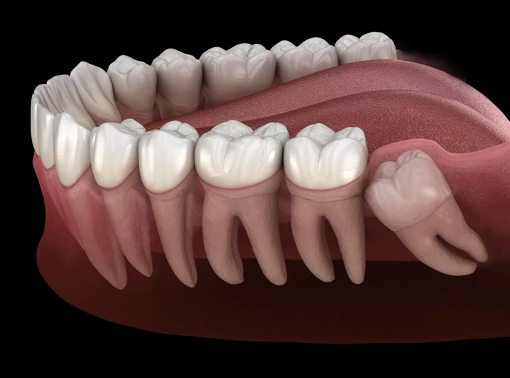wisdom teeth extractions in Southport
Wisdom Teeth
Southport Park Family Dental
Wisdom Teeth
Wisdom teeth are at the very back of the jaw and are also known as the third molar. Most people have four wisdom teeth, two in the lower jaw and two in the upper jaw. Some people have no wisdom teeth at all. Wisdom teeth usually do not push through the gums until people are in their late teens, twenties or even older. Wisdom teeth are usually the last teeth to come through the gums.

Problem Wisdom Teeth
Not everyone will have problems with their wisdom teeth. Some wisdom teeth will come through (erupt) the gum normally with no issues. Others may not have their wisdom teeth come through at all. Some wisdom teeth may not come through the gum completely (partially erupted) while some may come through too far (over-erupt). In many people, not enough space is at the rear of the jaws for wisdom teeth to come easily through the gums. If the jaw does not have enough space for a wisdom tooth to come through, the tooth will become wedged in or “impacted”. When a tooth is impacted, it may come through at an angle and push into another tooth, the gum or jawbone.
Some impacted wisdom teeth remain in place and cause no trouble. However, other impacted wisdom teeth may cause severe problems and must be removed. When a wisdom tooth is impacted it may make it difficult to clean the tooth properly, as well as the tooth next to it which can lead to tooth decay and gum infection. If one (or more) of your wisdom teeth causes problems, your dentist may recommend that it be removed. Removal of troublesome wisdom teeth should usually be done as soon as possible before the problems get worse.
Early Removal of Wisdom Teeth
Your Southport Park Family dentist may recommend early removal of one or more wisdom teeth due to the following reasons:
- There is not enough room for the tooth to push through
- The tooth has started to cause trouble. It should be removed soon so that pain, infection or other problems do not get worse
Wisdom Teeth Extractions
The method of extraction will vary depending on the type of tooth, its roots anatomy, and its position in the jaw. Some teeth are relatively easy to remove, while others can be difficult. Difficult extractions are usually due to:
- Extensive decay and/or large restorations (fillings) in the tooth
- Adjacent teeth having crowns or large restorations (fillings)
- The tooth is in an abnormal position that affects neighbouring teeth
- An unerupted or impacted tooth, or a tooth that is fused to the jaw bone (ankylosis)
- A nerve lying near the tooth to be extracted
- Roots that are large and curved or that penetrate deeply into the jaw bone
In difficult cases, the tooth may have to be surgically divided into segments so it can be removed easily and safely.
Post Wisdom Tooth Extraction
- Rest at home
- Do not drive, engage in active exercise or operate machinery
- Take several days off work, school or other duties
- Avoid drinks containing alcohol if you are taking painkillers or antibiotics
- Eat soft foods such as soups, blended (pureed) vegetables and meats, and gelatine for the first two days
- Drink lots of water
- Use ice packs to reduce any swelling and pain
extraction
patients
extraction
patients
.
.

